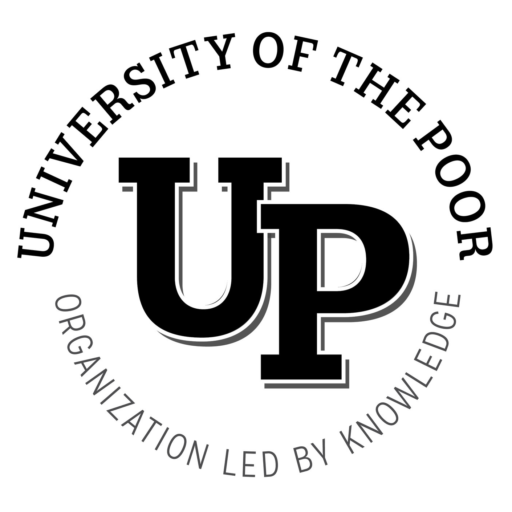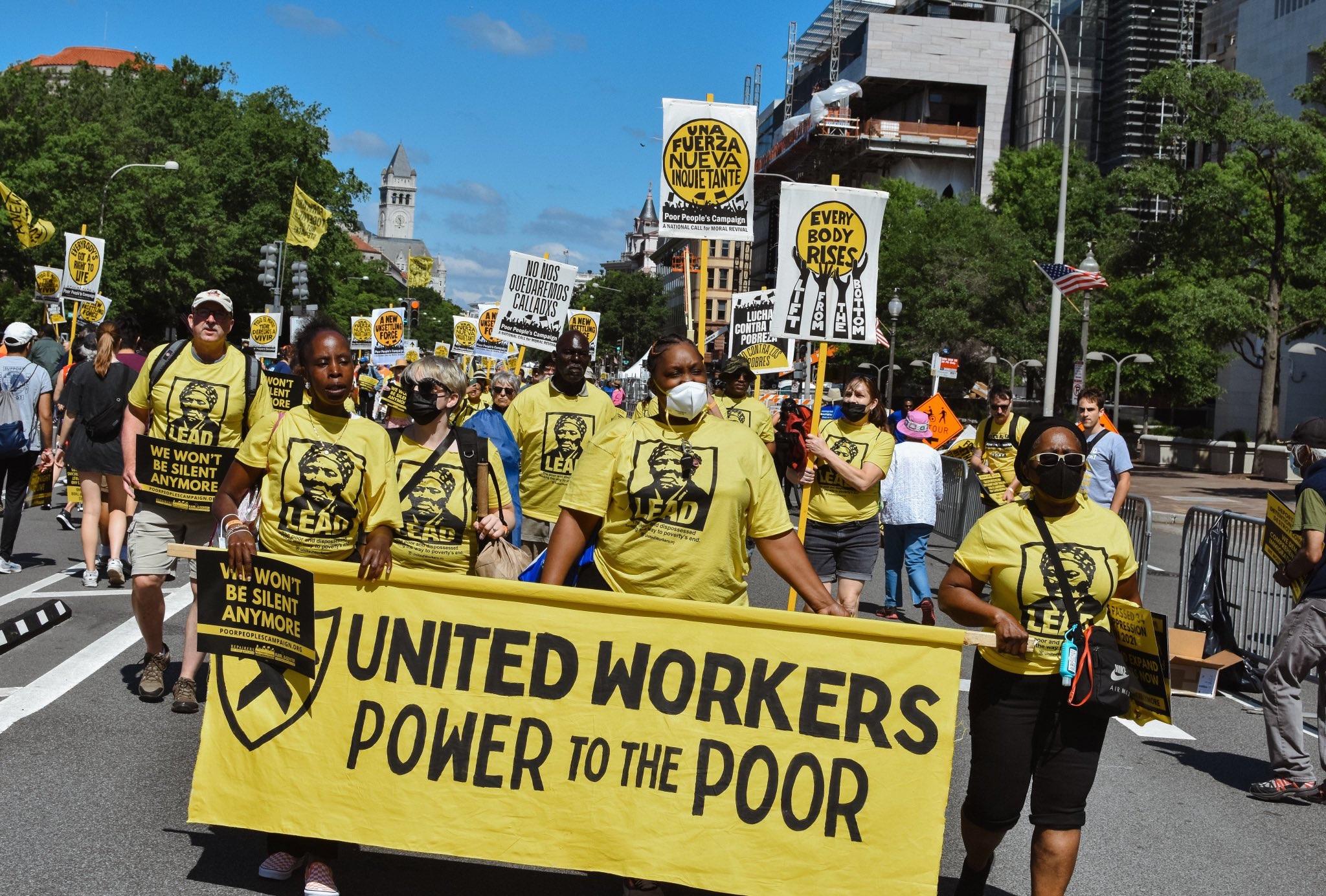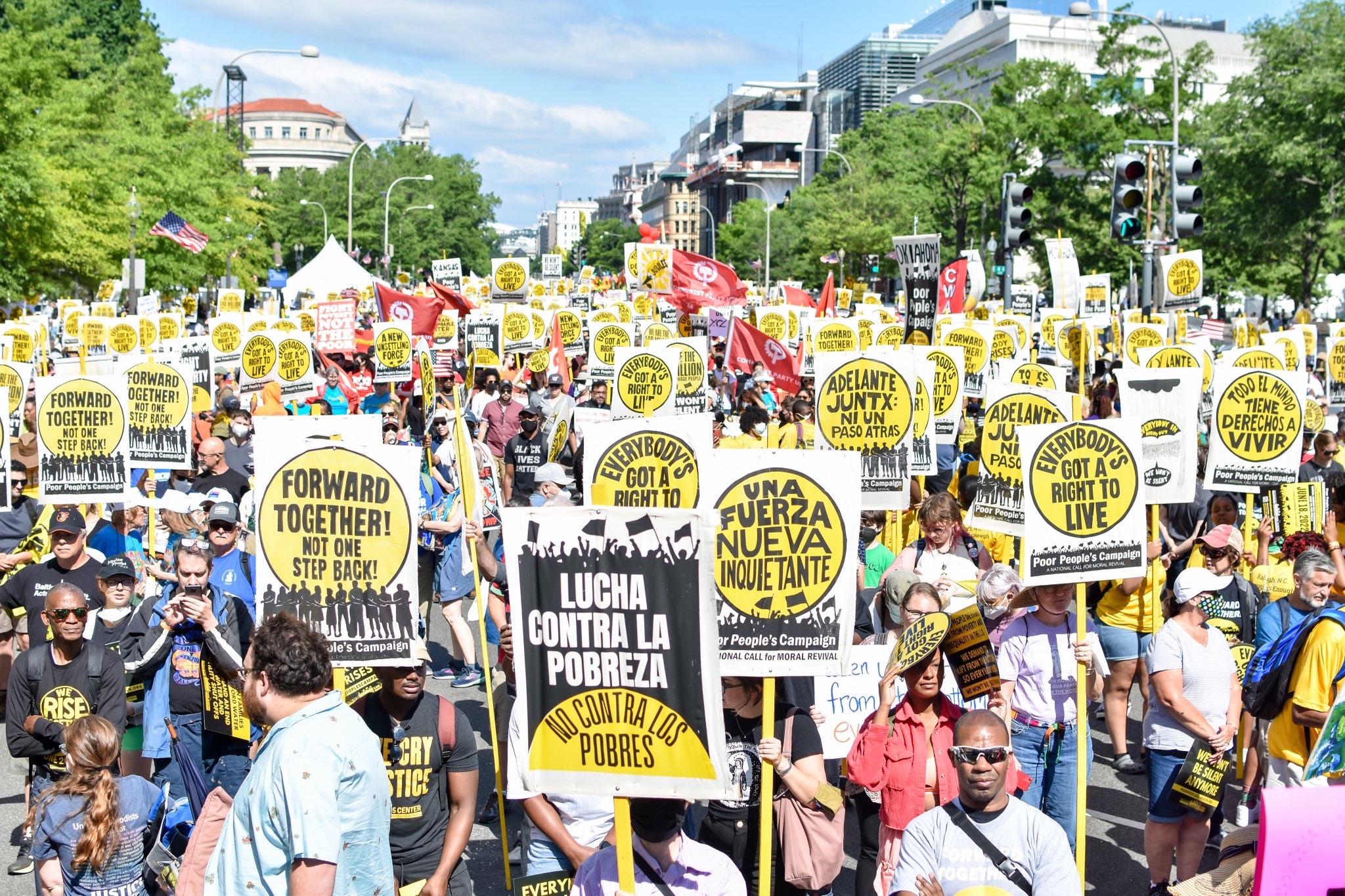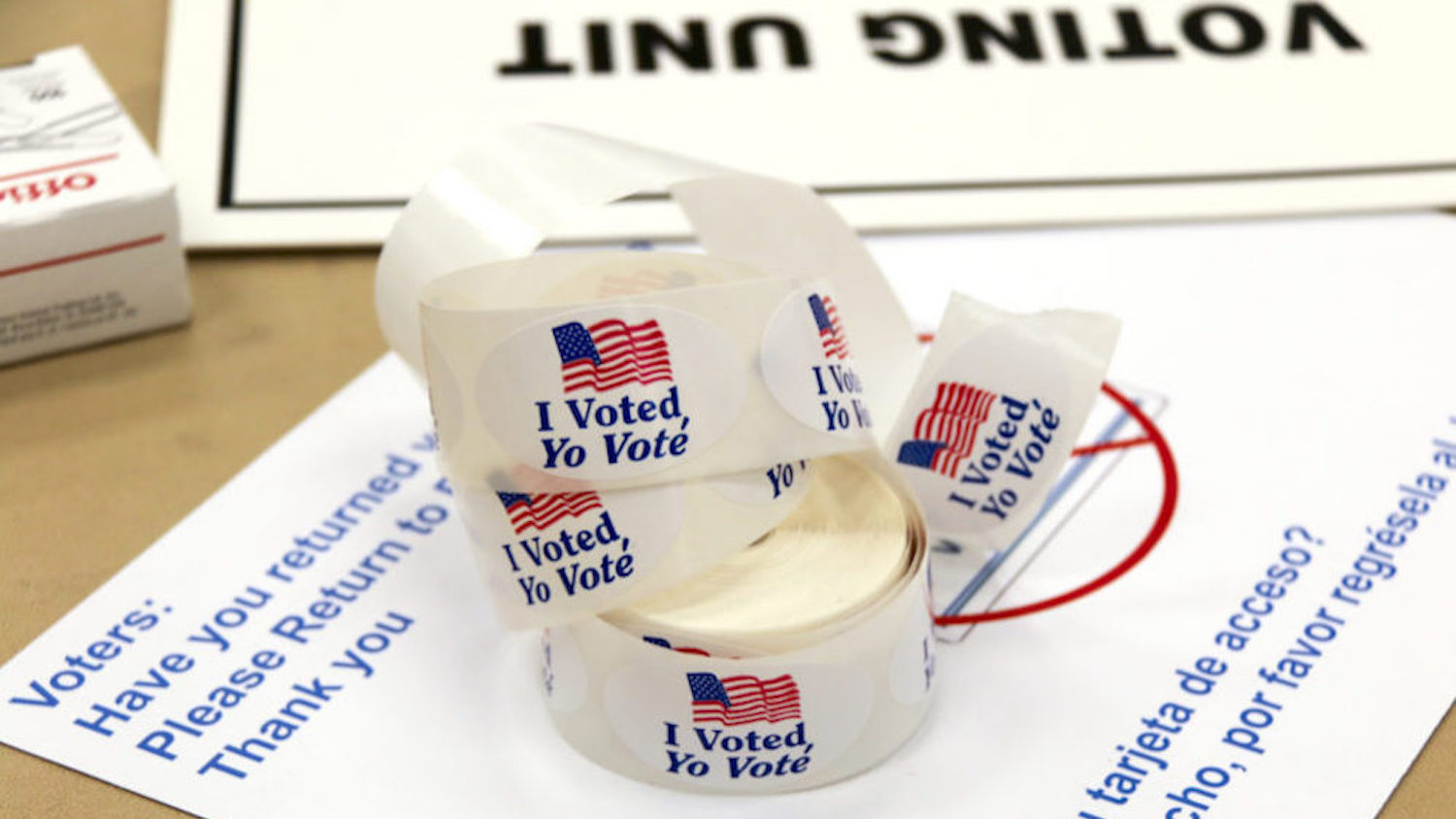The University of the Poor Journal’s Tim W. Shenk sat down with Ashley Hufnagel, Executive Director of United Workers in Maryland, to reflect on the United Workers’ participation in the Mass Poor People’s and Low-Wage Workers’ Assembly and Moral March on Washington and to the Polls on June 18, 2022.
Tim W. Shenk: It was great to see the United Workers show up in force on June 18. You all had those beautiful Harriet Tubman t-shirts – the black and yellow color scheme worked out really well!
Ashley Hufnagel: Yes! It helps that our colors are the same as the Poor People’s Campaign. We were thrilled to be there. It was amazing to take in the scale and diversity of people who mobilized from all over the country to come to D.C. and raise their voices for a poor people’s agenda.
TS: You didn’t just magically appear a hundred strong on June 18. There must have been a lot of work that went into getting people there. How did United Workers think about this mass mobilization in relation to your organizing work in Maryland?
AH: We had three main objectives for ourselves in relation to the Mass Assembly. First was internally to clarify our commitment as the United Workers to building the Poor People’s Campaign. At our annual Leadership Day in April, we discussed the 1968 Poor People’s Campaign, King’s vision and strategy, and the ongoing poor people’s movements that lay the foundation for today’s campaign. We talked about how and why United Workers has been a part of this effort to reignite the Poor People’s Campaign, even prior to the official launch. We did all of this before even talking about June 18th, because it is important that we continually recognize that it’s more than a mobilization.
From this basis, members were really able to see why our participation was important and to take up the Campaign’s call to be mobilization captains – the idea that you weren’t just going to attend the assembly yourself, but that you would turn people out. We worked with our members to make organizing plans, script organizing conversations, and practice telling their friends, families and coworkers why this event was important. Then we had about three months’ leadup to the mobilization. It was a leadership development opportunity for each of us to practice and hone our mobilizing muscles and learn more about the Poor People’s Campaign and our leadership within it.
TS: Your members were the ones recruiting for the mobilization? What about the staff of the organization – did they participate as well?
AH: We’re a mass membership organization of the poor. We decided that we were going to mobilize for this based on our members taking leadership, not making staff organizers responsible for turning out each individual person. We drew inspiration here from Put People First! PA, taking an approach where staff acted more as “root coordinators,” buddying up with members to draw up plans and strategize about how they were going to go about it. This process with leaders was primary for us, the overall turnout was secondary.
TS: I did see a lot of yellow Harriet shirts out there!
AH: Yes, and we’re proud of that. We met our mobilization target, it was just a different approach. The true success of this for us was giving our people the experience and the confidence to go out and recruit people close to them for an event that they felt passionately about. It was a good warm up for our statewide outreach season, which we’re in right now.
TS: You mentioned you had three objectives. What was the third?
AH: The third was more external in scope. We wanted to use the June 18 mobilization to raise the visibility of United Workers as a mass organization of the poor in Maryland. This is harder to measure, and definitely not a one and done kind of thing. It will take time and repetition to assess how we’re doing on that front. But we think it’s important to help make a case for the critical role of mass organizations of the poor in shaping the character and direction of the Poor People’s Campaign.
In many of the conversations I’ve had, there is an overly simplistic understanding of what the leadership of the poor means. It tends to get individualized. People think they need to follow or listen to one person who is poor, or they hold up individual people as examples of the leadership of the poor. Certainly individual leaders from the ranks of the poor are critical, but it’s individual leaders who are committed to uniting and organizing the poor as a class. It is the leadership of the poor as a social force that will be a “new and unsettling force.” How do we cohere this social force?
As Rev. Barber often says, the Poor People’s Campaign: A National Call for Moral Revival is not an organization, it is an organism. The distinction between campaign and organization is also really important. More to say here, but they both have a role to play together in building this broader movement.
The United Workers is an informal builder of the Poor People’s Campaign just through the nature of the work we do and who we organize. But we also want to show up and contribute in a meaningful way in the formal spaces and formal work of the campaign. Figuring out how we practically merge the demands of the informal and formal work is still an ongoing challenge, but our approach to June 18th was an exercise in seeing how these might be in harmony with each other rather than in competition. How can the two benefit each other? How can we use each to build the other? Can both be vehicles for developing clear, competent, committed and connected leaders of our class?
TS: Thanks so much, Ashley. Any closing thoughts?
AH: I’d like to raise up some of the media work that our members did at and following June 18. That’s part of our understanding of leadership development as well. People sharing their perspectives on what they saw and the significance of a day like this in a larger trajectory of building a movement. I’d like to include a couple of those pieces here that we shared in a United Workers e-blast this summer to give you a taste of what the Mass Assembly meant to us.
Member Reflections of June 18th
By Mike Hughes
On the weekend of Juneteenth 2022, the Poor People’s Campaign gathered for a Moral March and Assembly, in Washington, DC. People arrived on buses from around the country, many to share their testimonies of struggle and survival. On stage, the theomusicology team was in force with a full gospel band and choir, stirring the crowd of several thousand with songs from the movement.
“There is power in our stories,” said one testifier, asking the crowd to close their eyes and imagine, “What would America look like?”
Another testifier talked of the shame they experienced growing up LGBTQ+ and how they wondered “if being myself was worth it? How can my existence be a threat?”
Other testifiers talked about how “incarcerated lives matter too.” How they made mistakes, but they are not a mistake, crying out, “I too am America.”
With the capital behind him, Bishop Reverend William Barber called for a Third Reconstruction Agenda, denouncing the politics of greed that leads to policy murder, calling it a moral crisis in America. “There comes a time,” he proclaimed, “when we must have a moral meeting … and we won’t be silent or unseen or unheard anymore.” He then spoke of building a fusion coalition of the rejected, the outsiders, of those at the bottom, to build a non-violent, moral army, announcing, “We are not an insurrection, but we are a resurrection.”
Those words, “not an insurrection, but a resurrection,” inspired me. My name is Mike Hughes. It was during the COVID lockdowns and the mass demonstrations protesting the murder of George Floyd that I first became aware of the Poor People’s Campaign. Watching a PPC rally on television, much like this year’s event, was where I first became involved, texting the number to sign up.
I live in Western Maryland with my wife and I’m the proud parent of four children. My wife and I are both disabled. Though our disabilities are hidden, they affect every part of our lives. I have autism. And my wife has heart failure, along with auto-immune disorders which force her to live in chronic pain. I am able to work. My wife is not. Our experiences have made me see how fragile life can be, how we’re only a couple of bad weeks from financial disaster.
Seeing the attack on our capital on television was one of the most traumatic events I’ve experienced as an American. “So it’s come to this,” I remember thinking. Since then, the efforts by red states to enact laws to suppress voting have intensified, trying to limit the vote to only the “real” Americans. Today’s march, however, declared that ALL AMERICANS ARE REAL AMERICANS, that all voices deserve to be heard, again, like Rev. Barber said, “we won’t be silent or unseen or unheard anymore.”
That message was reinforced by co-chair Reverend Liz Theo Harris when she said, “Hope comes from the bottom. We will transform this nation from the bottom up.”
Later, Bernice King, daughter of the late Dr. Martin Luther King, Jr., declared that poverty is violence, and that our nation doesn’t suffer from a deficit of resources, but a deficit of will. Stating that poverty is not someone else’s problem, that the least of these is becoming the most of these, and poverty will not stop at low-income workers. Poverty is a system that will continue to consume more and more people.
Throughout the day, a blustery wind kept the participants cool, with several speakers commenting that the spirit was moving. While storm clouds threatened briefly to rain out the event, the wind prevailed and brushed away the clouds.
The event ended with singing and with Rev. Barber calling for viewers to join the movement, then he offered an outline of the Poor People’s Campaign’s plans for non-violent direct action in the halls of Congress in September. As one speaker said, “This isn’t the end, it’s the beginning.”
Video Reflections from Father Ty
United Workers leader Father Ty Hullinger gave his thoughts on the mass march from the middle of the action in D.C. on June 18th. Be sure to subscribe to our YouTube channel for more footage from the ground and other content from the United Workers Media Team!
Ashley Hufnagel is an organizer, artist, and scholar in the movement to end poverty since 2006. She was a leadership organizer with United Workers from 2006-2012, helped to co-found Oak Hill Center for Education and Culture in 2013, and in 2021, she earned her PhD in American Studies at the University of Maryland, College Park. She is currently the executive director of United Workers, a poor people’s human rights organization in Maryland.
Mike Hughes is a member of the Maryland Poor People’s Campaign.
Top image: Emily Farthing



